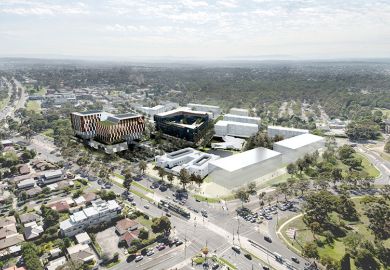Australia’s richest university is locked in a battle with one of its academics over its refusal to disclose details of its A$4.9 billion (£2.6 billion) property holdings.
The University of Melbourne declined a freedom of interest (FoI) application from Michael Zyphur, an associate professor of human resources management, for a list of its real estate assets and their current or recent valuations.
The university’s FoI officer ruled Melbourne exempt from releasing the “commercially sensitive” information that was “not available in the public domain”. Its disclosure would give potential business partners or competitors a “threshold” for future commercial arrangements, placing the university at a “commercial and competitive disadvantage”, she said. “It was not practicable to redact [the] document, so it is unable to be released.”
That decision was overturned in September by the Office of the Victorian Information Commissioner (OVIC), which directed the university to release the 13-page document in full. An OVIC deputy commissioner reasoned that many of Melbourne’s properties were “not reasonably likely to be subject to imminent sale or commercial leasing, as they are essential to the agency carrying out its functions…in any case, the estimated value would likely be disclosed publicly should [they] be offered for sale”.
Melbourne has appealed that ruling with the Victorian Civil and Administrative Tribunal (VCAT).
Dr Zyphur said that the community had a right to know about Melbourne’s “substantial” assets. “As a public entity, the university has an obligation to be transparent about how it is spending its money,” he argued in his application to OVIC. “Valuations can be conducted at any time by external parties, so there is no good argument for withholding this information.”
Melbourne’s most recent annual report lists its total assets at A$9.5 billion, up 47 per cent over the past four years and 7 per cent during 2020. The value of its land and property has appreciated by 20 per cent over the past two years.
Australian institutions with far more modest holdings, including Western Sydney, La Trobe, Flinders, Griffith and Edith Cowan universities, are turning to real estate dealings to fund their operations and expansion. Some critics say such activities are inconsistent with universities’ missions.
Dr Zyphur said details of landholdings should be in the public domain so that politicians, university employees, unions and other community members could have an informed debate about such issues. “The problem is not with the university purchasing and owning land, for example, or making any other kinds of financial investments,” he told Times Higher Education. “The issue is one of transparency. The only way to ensure that the university is doing what it’s meant to be doing is by being transparent about how it spends its money.”
Dr Zyphur has also asked each Group of Eight university to detail the salary and bonuses paid to their 50 most highly remunerated employees. While most institutions have complied, Melbourne refused on the grounds that doing so would be administratively onerous. OVIC also overruled this decision, directing the university to process Dr Zyphur’s request.
Melbourne said it was “still processing” the salary information. “The landholding matter is before VCAT so it would be inappropriate to comment at this time,” a spokeswoman added.
Dr Zyphur also declined to comment on the VCAT proceedings, but said that he expected the matter to be resolved “very soon”.





